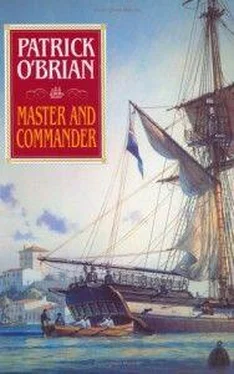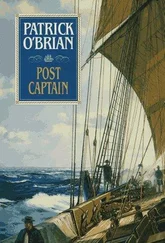'Sir,' said the midshipman of the maintop as he made his way down, 'Andrews here thinks she's the Dйdaigneuse.'
'Look again with my glass,' said Dillon, passing his telescope, the best in the sloop.
'Yes. She's the Dйdaigneuse,' said the sailor, a middle-aged man with a greasy red waistcoat over his bare copper-brown upper half. 'You can see that new-fangled round bow. I was prisoner aboard of her a matter of three weeks and more: took out of a collier.'
'What does she carry?'
'Twenty-six eighteen-pounders on the_ main deck, sir, eighteen long eights on the quarter-deck and fo'c'sle, and a brass long twelve for a bow-chaser. They used to make me polish 'un.'
'She is a frigate, sir, of course,' reported James. 'And Andrews of the maintop, a sensible man, says she is the
Dйdaigneuse. He was a prisoner in her.'
'Well,' said Jack, smiling, 'how fortunate that the evenings are drawing in.' The sun would, in fact, set in about four hours' time, the twilight did not last long in these latitudes, and this was the dark of the moon. The Dйdaigneuse would have to sail nearly two knots faster than the Sophie to catch her, and he did not think there was any likelihood of her doing so – she was heavily armed, but she was no famous sailer like the Astrйe or the Pomone. Nevertheless, he turned the whole of his mind to urging his dear sloop to her very utmost speed. It was possible that he might not manage to slip away in the night – he had taken part in a thirty-two-hour chase over more than two hundred miles of sea on the West Indies station himself – and every yard might count. She had the breeze almost on her larboard quarter at present, not far from her best point of sailing, and she was running a good seven knots; indeed, so briskly had her numerous and well-trained crew set the royals and studdingsails that for the first quarter of an hour she appeared to be gaining on the frigate.
'I wish it may last,' thought Jack, glancing up at the sun through the poor flimsy canvas of the topsail. The prodigious spring rains of the western Mediterranean, the Greek sun and piercing winds had removed every particle of the contractor's dressing as well as most of the body of the stuff, and the bunt and reefs, showed poor and baggy: well enough before the wind, but if they were to try a tacking-match with the frigate it could only end in tears – they would never lie so close.
It did not last. Once the frigate's hull felt, the full effect of the sails she spread in her leisurely fashion, she made up her loss and began to overhaul the Sophie. It was difficult to be sure of this at first – a far-off triple flash on the horizon with a hint of darkness beneath at the top of the rise – but in three-quarters of an hour her hull was visible from the Sophie's quarter-deck most of the time, and Jack set their old-fashioned spritsail topsail, edging away another half point.
At the taffrail Mowett was explaining the nature of this sail to Stephen, for the Sophie set it flying, with a jack-stay clinched round the end of the jib-boom, having an iron traveller on it, a curious state of affairs in a man-of-war, of course; and Jack was standing by the aftermost starboard four-pounder with his eyes recording every movement aboard the frigate and his mind taken up with the calculation of the risks involved in setting the topgallant studdingsails in this freshening breeze, when there was a confused bellowing forward and the cry of man overboard. Almost at the same moment, Henry Ellis swept by in the smooth curving stream beneath him, his face straining up out of the water, amazed. Mowett threw him the fall of the empty davit. Both arms reached up from the sea to catch the flying line: head went under – hands missed their hold. Then he was away behind, bobbing on the wake.
Every face turned to Jack. His expression was terribly hard. His eyes darted from the boy to the frigate coming up at eight knots. Ten minutes would lose a mile and more: the havoc of studdingsails taken aback: the time to get way on her again. Ninety men endangered. These considerations and many others, including a knowledge of the extreme intensity of the eyes directed at him, a recollection of the odious nature of the parents, the status of the boy as a sort of guest, Molly Harte's protйgй, flew through his racing mind before his stopped breath had begun to flow again.
'Jolly-boat away,' he said harshly. 'Stand by, fore and aft. Stand by. Mr Marshall, bring her to.'
The Sophie flew up into the wind: the jolly-boat splashed into the water. Very few orders were called for. The yards came round, her great spread of canvas shrank in, halliards, bunt-lines, clew-lines, brails racing through their blocks with scarcely a word; and even in his cold black fury Jack admired the smooth competence of the operation.
Painfully the jolly-boat crept out over the sea to cut the curve of the Sophie's wake again: slowly, slowly. They were peering over the side of the boat, poking about with a boat-hook. Interminably. Now at last they had turned; they were a quarter of the way back; and in his glass Jack saw all the rowers fall violently into the bottom of the boat. Stroke had been pulling so hard that his oar had broken, flinging him backwards.
'Jesus, Mary…' muttered Dillon, at his side.
The Sophie was on the hover, with some way on her already, as the jolly-boat came alongside and the drowned boy was passed up. 'Dead,' they said. 'Make sail,' said Jack. Again the almost silent manoeuvres followed one another with admirable rapidity. 'Too much rapidity. She was not yet on her course, she had not reached half her former speed, before there was an ugly rending crack and the foretopgallantyard parted in the slings.
Now the orders flew: looking up from Ellis' wet body, Stephen saw Jack utter three bouts of technicalities to Dillon, who relayed them, elaborated, through his speaking-trumpet to the bosun and the foretopmen as they flew aloft; saw him give a separate set of orders to the carpenter and his crew; calculate the altered forces acting on the sloop and give the helmsman a course accordingly; glance over his shoulder at the frigate and then look down with a sharp attentive glance. 'Is there anything you can do for him? Do you need a hand?'
'His heart has stopped,' said Stephen. 'But I should like to try.… could he be slung up by the heels on deck? There is no room below.'
'Shannahan. Thomas. Bear a hand. Clap on to the burton-tackle and that spun-yarn. Carry on as the Doctor directs 'you. Mr Lamb, this fish…
Stephen sent Cheslin for lancets, cigars, the galley bellows; and as the lifeless Henry Ellis rose free of the deck so he swung him forwards two or three times, face down and tongue lolling, and emptied some water out of him. 'Hold him just so,' he said, and bled him behind the ears. 'Mr Ricketts, pray be so good as to light me this cigar.' And what part of the Sophie's crew that was not wholly occupied with the fishing of the sprung yard, the bending of the sail afresh and swaying all up, with the continual trimming of the sails and with furtively peering at the frigate, had the inexpressible gratification of seeing Dr Maturin draw tobacco smoke into the bellows, thrust the nozzle into his patient's nose, and while his assistant held Ellis' mouth and other nostril closed, blow the acrid smoke into his lungs, at the same time swinging his suspended body so that now his bowels pressed upon his diaphragm and now they did not. Gasps, choking, a vigorous plying of the bellows, more smoke, more and steadier gasps, coughing. 'You may cut him down now,' said Stephen to the fascinated seamen. 'It is clear that he was born to be hanged.'The frigate had covered a great deal of sea in this time, and now her gun-ports could be counted without a glass. She was a heavy frigate – her broadside would throw three hundred pounds of metal as against the Sophie's twentyeight – but she was deep-laden and even in this moderate wind she was making heavy weather of it. The swell broke regularly under her bows, sending up white water, and she had a labouring air. She was still gaining perceptibly on the Sophie. 'But,' said Jack to himself, '1 swear with that crew he will have the royals off her before it is quite dark.' His intent scrutiny of the Dйdaigneuse's sailing had convinced him that she had a great many raw hands aboard, if not a new crew altogether – no uncommon thing in French ships. 'He may try a ranging shot before that, however.'
Читать дальше
Конец ознакомительного отрывка
Купить книгу












